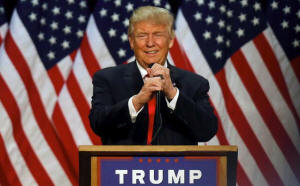|
Trump's about-face on fund-raising seems
unlikely to dent his popularity
 Send a link to a friend
Send a link to a friend
[May 13, 2016]
By Michelle Conlin
NEW YORK (Reuters) - Supporters of
billionaire Donald Trump appear unfazed by his decision to accept money
from outside donors, despite his earlier vow to self-fund his
presidential campaign and his criticism of rivals as puppets of wealthy
special interests.
|

Republican U.S. presidential candidate Donald Trump speaks at a campaign
rally in Eugene, Oregon, U.S. on May 6, 2016. REUTERS/Jim Urquhart |
|
 The vow has been a cornerstone of Trump's election strategy to
present himself as an outsider who is not in the pocket of rich
donors, even though he has accepted more than $12 million in
contributions so far. The strategy paid off last week when the New
York businessman emerged as the Republican party's presumptive
presidential nominee, after sweeping a series of state nominating
contests. The vow has been a cornerstone of Trump's election strategy to
present himself as an outsider who is not in the pocket of rich
donors, even though he has accepted more than $12 million in
contributions so far. The strategy paid off last week when the New
York businessman emerged as the Republican party's presumptive
presidential nominee, after sweeping a series of state nominating
contests.
Since then, Trump has said he would no longer self-finance and would
work with the party to raise more than $1 billion to help him fight
his eventual Democratic Party challenger. Critics accused him of
flip flopping, but some supporters don't agree.
Three dozen of the 40 pro-Trump voters Reuters interviewed said they
were not concerned about his reversal. Only four indicated the
switch made them uneasy, though all of them said they would still
support him.
Most of those interviewed applauded the way the celebrity
businessman billed himself as a "blue-collar billionaire" who didn't
need other people's money, but said they understood Trump would need
far more resources to compete in the general election.
 They would have no problem donating to the billionaire, albeit in
the same kind of small increments that Democratic presidential
candidate Bernie Sanders has used to build his nearly $200 million
fundraising juggernaut.
"Even though I'm on welfare, I would donate to Trump," said Pamela
Thompson, a 46-year-old mother of three school-age kids from Tulsa,
Oklahoma. "And my kids would run a lemonade stand to help elect
him."
The supporters interviewed said Trump's pledge to self-finance his
campaign was less important to them than his promises to crack down
on undocumented workers and ease the pain of mostly white, blue
collar towns that have seen manufacturing jobs lost to developing
countries.
Sharon Jones, a 53-year old Wal-Mart cashier from Coleman County,
Alabama, says her anger over undocumented immigrants shopping at her
store on welfare benefits is animating her support for Trump, who
has promised to deport undocumented workers and build a wall along
the U.S. border with Mexico.
[to top of second column] |

"They are doing better than I am on my $9.45 an hour," Jones said.
The majority of supporters interviewed said they thought Trump's
decision to fundraise was strategically wise given that Hillary
Clinton, the front-runner for the Democratic nomination, has raised
more than $250 million so far.
In the 2012 election, Republican nominee Mitt Romney and his
Democratic opponent, President Barack Obama, each raised $1 billion.
"You gotta fight fire with fire. Bring it on," said Cheryl Ressler
Halvorson, a cattle rancher from Williston, North Dakota whose
support for Trump stems mainly from her ire over having to pay
$1,100 a month for health insurance with a $13,000 deductible due to
the government mandate known as Obamacare.
Halvorson is not an outlier. Most Trump supporters have stayed loyal
despite the candidate frequently reversing or updating policy
positions on key economic and social issues.
Trump is not the first U.S. presidential candidate to change his
mind about financing his election campaign.
In the 2008 election, Obama also did an about-face. He said he would
forego public financing of his general election campaign against
Republican John McCain. This was a reversal of his earlier stance
and it allowed him to pursue a record fund-raising effort.
Supporters were unfazed by the shift and Obama went on to win the
election.
(Additional reporting by Grant Smith and Chris Kahn, editing by Ross
Colvin)
[© 2016 Thomson Reuters. All rights
reserved.]
Copyright 2016 Reuters. All rights reserved. This material may not be published,
broadcast, rewritten or redistributed.
 |